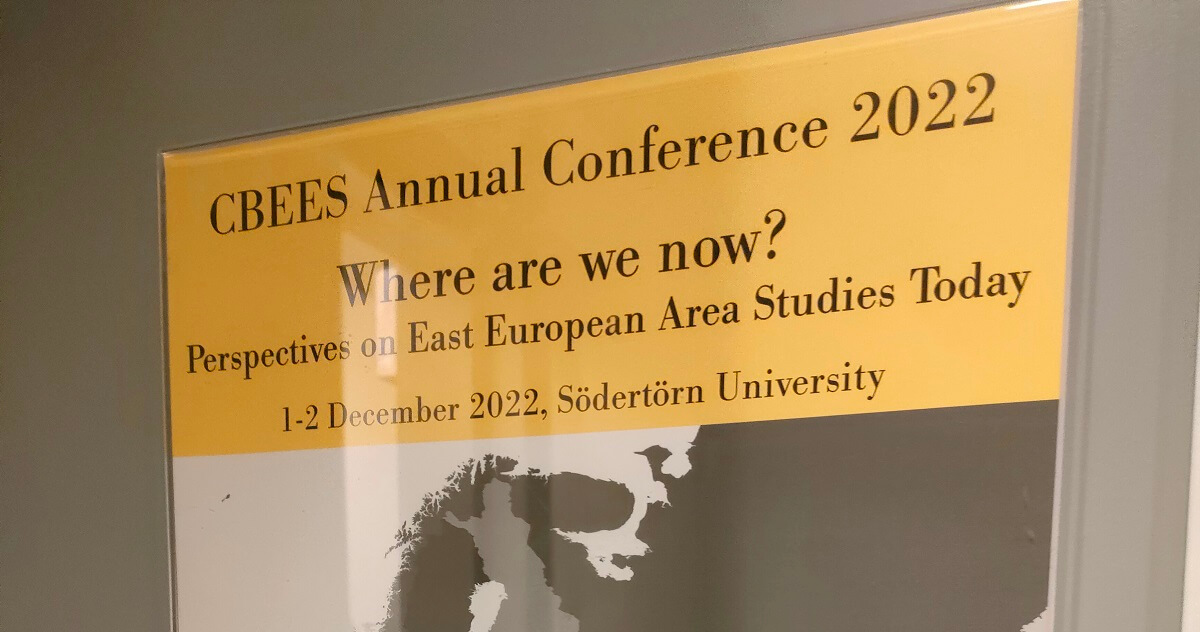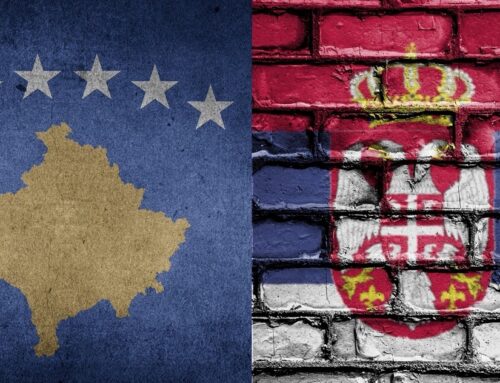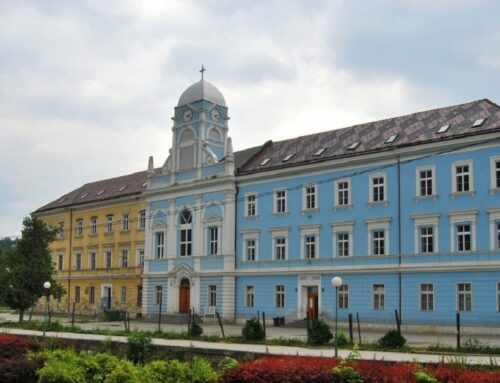The future of the Eastern European Area Studies:
A conference to reflect at the turn of the year
1-2 December 2022
Centre for Baltic and East European Studies (CBEES),
Södertörn University of Stockholm.
Conference report
Michela Romano
The two-days conference “Where are we now? Perspectives on Eastern European Area Studies Today” was held on December 1-2, 2022, at the
The Russian invasion of Ukraine in February 2022 exacerbated a crisis that was already deeply rooted in the past and well established between the two realities. The events involving the two countries provoked a severe earthquake among all the post-Soviet areas and a huge debate above definitions, coordinates and referring points of post-soviet and postcolonial studies. As asserted in the conference statement “for the past 30 years, as an area, Eastern Europe and post-Soviet states have been defined as post-communist, and the space belonging to the former Soviet Union as post-Soviet. “Post” has marked a transition through a process of continuation and negation. The war may end this condition of “post”, implying the collapse of the post-Soviet geopolitical consensus”.
The conference gave the opportunity to engage a huge and intense debate especially focusing on methodologies and approaches towards the Eastern European studies with an urgence to challenge the traditional categories and definitions. It aimed at answering the following interrogatives:
“What is happening to area studies? Where are we now, as a consequence of the war? What new theoretical and methodological instruments do we need in this new situation? How is knowledge produced, and by whom? How can we work in and with the area today?”
The conference provided the space for an academic debate in which scholars and intellectuals presented their most recent research findings. The event was multi-disciplinary and embraced a variety of perspectives and approaches from Political Science, Sociology, History, Economics, Art, literary and cultural studies. Overall, a great attention was given to roundtables and plenaries and among that were all extremely insightful and enriching is worth mentioning the lesson released by Vitaly Chernetsky, professor of Slavic Languages and Literatures at the University of Kansas, titled “Recognizing and Addressing Epistemic Injustice: Russia’s War against Ukraine and a Paradigm Shift in East European Studies”.
The event was organized in six sessions with four or five presentations each commented on by presenters and audience. This short report will give a brief insight into some selected topics and their contribution overall to the conference issue. The official opening of the conference was anticipated by an early key-note roundtable titled “Reconsidering East European Studies: Potentials, Limitations and (Ab)Uses” chaired by Yulia Gradskova (Södertörn University).
After a brief presentation of the conference themes and the CBEES work by the director Per Bolin and a brief introduction of the role of the Council of the Baltic Sea States in Stockholm by the general director Grzegorz Poznański, the conference opens with the first session divided into four parallel venues 3-5 presentations each. The Ukrainian war was the clear focus of several panels from the very first venue, focusing on Donbas region, the production of knowledge in the area and its political attitudes with presentation such as the one of Emma Rimpiläinen (Uppsala University) entitled “Doubtful Convinction: knowledge production about the Warin Donbas since 2014”. Other panels had a brilliant orientations towards colonial, postcolonial and decolonial frameworks with presentations such as “Perspectives on the Decolonization of the Est European Studies” by Olha Voznyuk (Ukrainian Free University in Munich) and a venue which was devoted to cultural identities and colonial influences with topics such as “Go Real, Go Low, Go Fan: the transformations of Masculinity and the Production of Consolation in Wartime Ukrainian Real-Person Fanfiction” by Eric Shlaifer and Masha Semashyna (Central European University). Discussions involved the situations and evolution of Russophone minorities in Baltic states with a presentation entitled “(Post-/De-) Colonial Baltic Shades: Fragmenting Russian Culture” by Michela Romano (University of Bologna), talking about the transformations that the Russian invasion brought to the Baltic states and Latvia in particular focusing on the conditions of the Russophone cultural productions and minority issues in those territories.
The following session was devoted to subjects such as the knowledge production in Baltic states in the aftermath of World War I and the framing of epistemic gateways in the region. The creation of knowledge after the First World Conflict and the nationalizing practices involving the Baltic states, interested Per Bolin’ (Södertörn University) “Creating Pure Latvian Knowledge: Academia Under Ulmanis Regime, 1934 – 1940”, and Kazimierz Musiał (University of Gdansk) presenting “The Temporal Contingency of Knowledge Regimes and Episteme in Area Studies” among others.
The third session was anticipated by the aforementioned lesson given by professor Vitaly Chernetsky on Epistemic injustice withing the Russian war against Ukraine. The discussion focused on the marginalization and dismission of Ukrainian voices and studies as a practice implemented in parallel with the invasion by Russia. As brilliantly explained, this still-on-going process aims at mining integrity and legitimacy of the Ukrainian state enhancing an intellectual challenge for the academic field and for the knowledge production in general. The lesson concluded with a strong invitation in practicing solidarity for Ukraine and going on supporting its narratives against external influences.
Sigrid Kaasik-Krogerus (University of Helsinki) shifted the focus in the panel “Mediatisation, (Mis)Representations and War” speaking about post-Soviet Urban space and the role of monuments within the historical and national identity of a country. Engaging the dialogue through the use of monuments and their reception, the presenter raised some interrogatives such as “Why some monuments can be in place? What factors lead to a relocation or a neutralization?”. She focused mainly on early observations of people reactions towards these elements in the urban space, leaving space for further research with a deepen analysis of the role of national politics within the so called “politics of stones”.
The sessions continue with a study named “Post-truth Politics During the War. Russian Political Propaganda Against Ukraine from the beginning of the War (2014) to its Escalation (February 24, 2022)” introduced by Alyona Hurkivska (Södertörn University). The discussion addressed the techniques and main topics distributed by the Russian propaganda after the escalation of the war and their transformations in relation to the national unity shown by Ukraine, the occupation of new territories and the improvement of domestic policies.
The session concluded with a speech conducted by Kateryna Boyko Uppsala University named “Valkyries and Madonnas: Women’s Representation and Agency During the Russo-Ukrainian War” and a presentation given by Roman Horbyk (Örebro University) “The Charms of Hyperreality: simulating Ukraine in Russia and the West”. Kateryna Boyko examined how posters and murals circulating online depict Women in Ukraine and messages such as “We are the Kyiv Valkyries, and we will send all of you to hell” manifested in Ukraine a will to intimidate and defend the state. She identified three images: cruel and eroticized Valkyries, caring and sacrificing Madonnas and primordial and scary witches. Among the observations of the audience, the presenter underlined those roles traditionally attributed to men, are this time applied to women as a result of the huge discussions of the last 30 years about gender studies within the state. The last presenter reflected on the simulacra of Russian and Ukraine created by the west and the consequent spread of wrong and distorted perceptions about the two states as sort of “imaginary hyperreality” which needs to be challenged.
The second day of the conference started with the IV session with a focus on Ethnology with topics such as “Geopolitical Battles and the Seemingly Mundane: Ethnological Knowledge of out Times” by Jenny Gunnarsson Payne & Florence Fröhlig (Södertörn University), Ivan Posylni University of Warsaw with a presentation titled “Ethnicities of Donbas in the Postcolonial Discourse” deepen the analysis on the Donbas region among Russian political propaganda ad use of the region and the fragmented European knowledge about the area. Away from the common constructed of Donbas as historically part of the Russian state, Posylni developed the discourse around the European pre-industrial roots in the area with the past presence of Belgian, English, Dutch, German, Greek ethnicities. Overall, the discussion supported the reconfiguration of the Donbas identity as detached from the Russian ethnic label.
The following topic “Old Divisions in the New Reality? On the Usefulness of the Concept of ‘Post-socialism’ in Ethnographic Research in Eastern Europe” by Aleksandra Reczuch (Södertörn University), where Reczuch challenged the definition “post—socialist” as an exploited and abused conditions, suggesting a more intersectional perspective on the issue. The conclusion of the panel was entrusted to Petra Garberding (Södertörn University) with the research “ Collaborations in Ethnology in Times of War and Crisis: Examples from Swedish-German Contacts 1933–1945 and during the Cold War”, illuminating on challenges that researchers can encounter in times of war and which can be the strategies to adopt.
The very last discussions of the conference were preceded by the Roundtable “Being scholar of “Area Studies” in the (Western) Academia: Challenge, Hopes and Visions for the future” led by Oleksii Chebotarov (University of Vienna), Natia Gamkrelidze Linnaeus/Malmö University, Roman Horbyk Örebro University and Botakoz Kassymbekova (University of Basel).
The V session started with two parallel panels focusing on the relation between politics, city and spaces and Geopolitics and international relations. Among the discussions faced, the scholar Gilda Hoxha (Mediterranean University of Albania, UMSH) introduced the discourse about Western Balkans and the relationships with Eu in the presentation “Open Balkan: Between the Practices of History”. Hoxha brilliantly explained the project “Open Balkan”, an economic and political area including Albania, North Macedonia and Serbia and the challenges faces meeting the Eu Geopolitical structures and power.
Meanwhile, in the parallel session scholars such as Oleksii Polegkyi (Polish Academy of Sciences) deepened the Geopolitical discourse with a presentation called “Analysing Russian-Ukrainian War: Memory, History and Emotions in International Relations” where a great attention was given to emotions as powerful influential factors in IR. Polegkyi observed the role of emotions in the use of memory and in Putin’s government identifying it as Hope/desire; Fear; Blame/guilt; Humiliation and Resentment.
The VI and final session of the Conference brought the attention to two parallel issues respectively entitled “The Politics of Funding and Promotion of Gender Equality and Sexual Rights in EU’s Eastern Partnership” and “Subjection and Resistance in Times of Authoritarianism”. The first panel disclosed some very interesting presentations such as Anna Kirey’s “Foreign Funding, Political Agendas and LGBTQ+ Activism in Eastern Europe in the Time of Crisis” (University of Gothenburg) and Maryna Shevtsova’s “Equality Measured: Addressing Western Gaze in Conducting Gender and Diversity Audit of Civil Society Organizations in Ukraine”(University of Ljubljana & KU Leuven). Simultaneously, the hosting Ksenia Medvedeva’s topic entitled “Re-coding of Dissonant Heritage: Symbols of Belarusian Protests in 2020” (Freie Universitaet Berlin), deepened the examination of visual symbols used in Belarus after the protest of 2020 and specifically the historical white-red-white flag conveying political messages. Medvedeva’s framework for the research was the “dissonat heritage”, the idea of plural interpretations, uses and positions related to the heritage of the state. The topic of the panel shifted to Olga Nikolaeva’s presentation “Why Does It Matter? Case of Russian Contemporary Theatre, Perspective of Study, and Finding Meaning” (Swedish Performing Arts Agency) which introduced the role of the Russian theater after the Ukrainian Invasion in relation to the Russian culture challenging status nowadays as well as the cruciality of the performance language and culture to continue preserving dialogue and knowledge. One final topic to be mentioned is the research conducted by Elena Rodina and Olga Dovbysh (University of Helsinki) “The Future of Russian Independent Journalism in Exile: in Search for Relevance and Resilience”. In the discourse, great relevance was given to the factors involving Russian independent Journalism outside Russia focusing on the issue of relevance, resilience and continuity. The discussion led to a dynamic debate about the future of exiled journalisms, the obstacles and challenges of Russophone voices abroad.
The conference’s center of attraction was the desire to share new methodologies and perspectives on Eastern European Area studies in light of the present Ukrainian war and its outcomes. The conference delt with a plurality of themes and research areas attempting at answering at the question “Where are we? “as scholars, scientists, researchers intellectuals and ultimately people of the Academia. The rich Academic and cultural environment created by the Södertörn University and the CBEES did not have the presumption of giving a solution to the ambitious question above, however succeeded in engaging an extremely virtuous debate about a needed transformation in Eastern European Area studies and about the nowadays tragic conditions of our fragile democracies which have never been hungrier of rich and brave discussions such the one held by this event.





